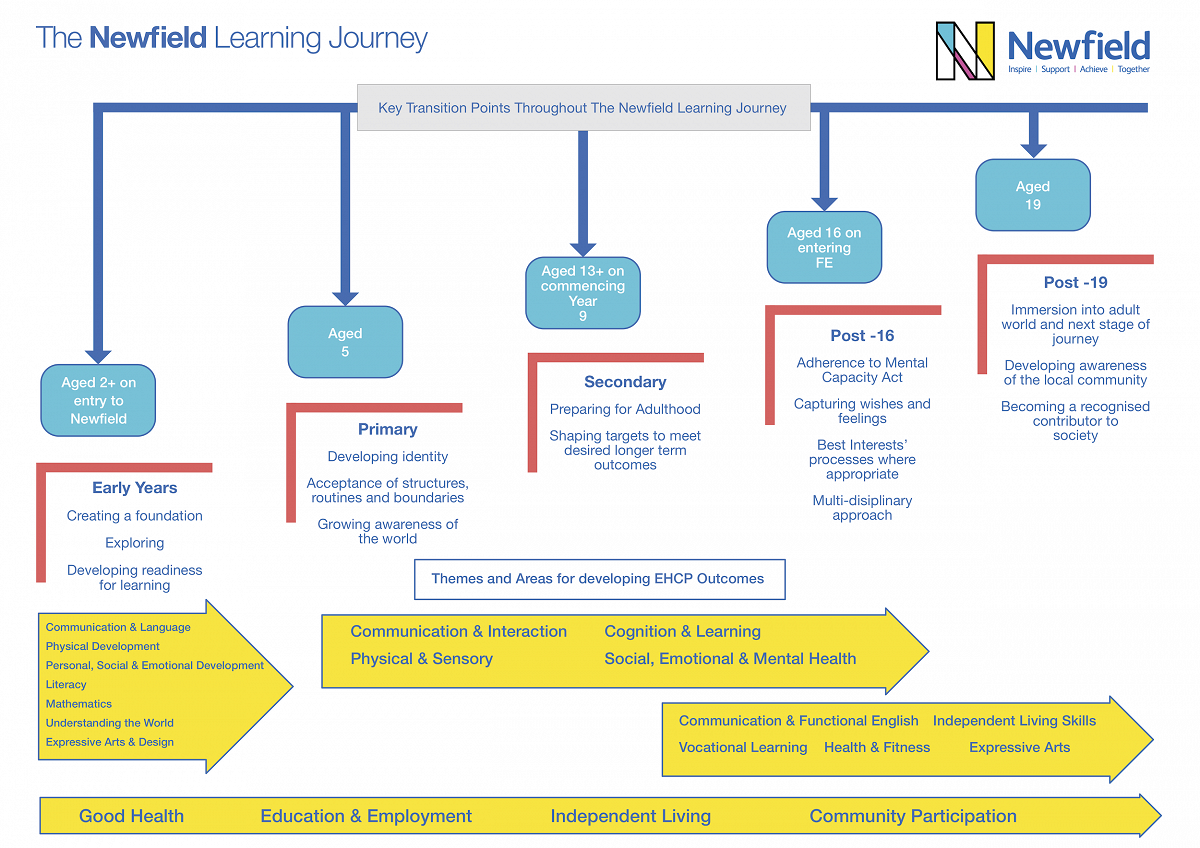Curriculum
Here you will find information about the broad, balanced, rich curriculum that our pupils of all ages access.
Personalised Learning Pathway
At Newfield we aim to provide a broad and balanced curriculum which is tailored to suit the individual learning needs of each of our children. Personalisation is key to how we enable our children to learn and develop to the very best of their potential.
The diagram below illustrates the learning pathway offered by Newfield.
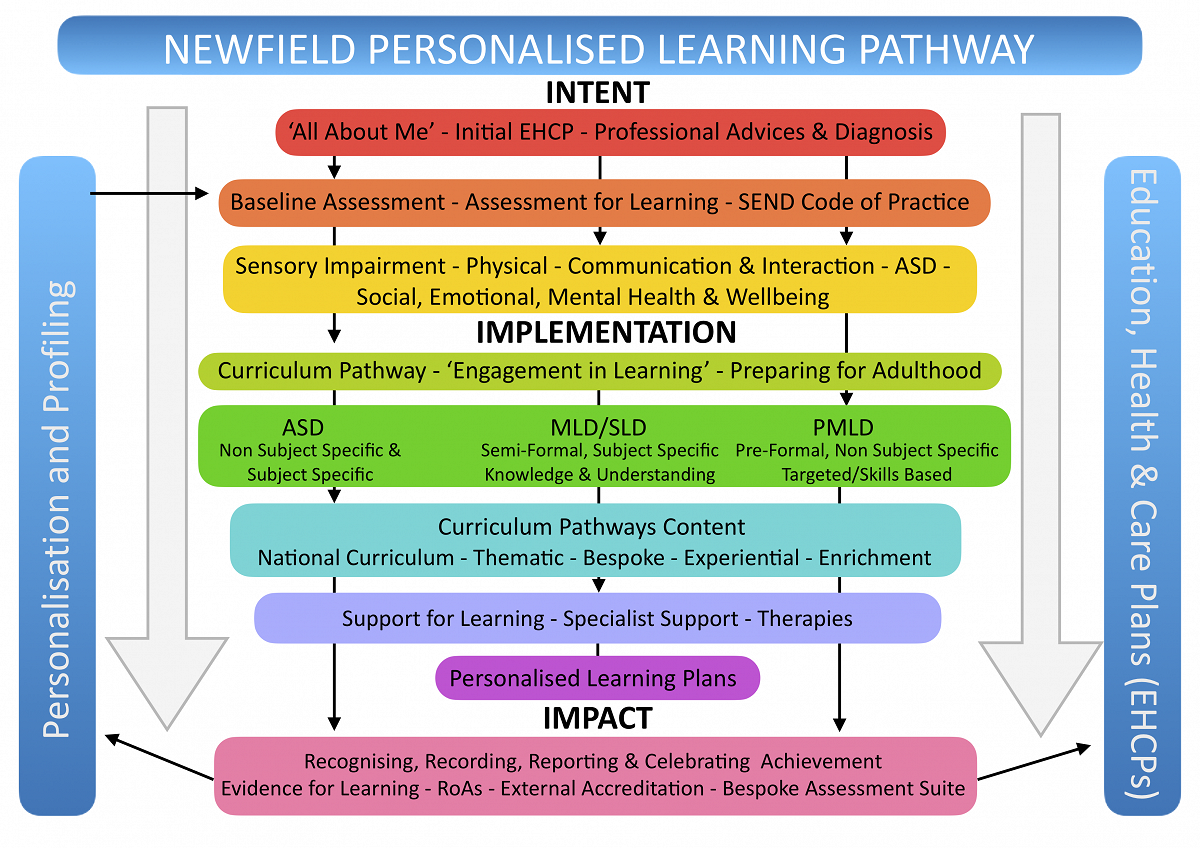
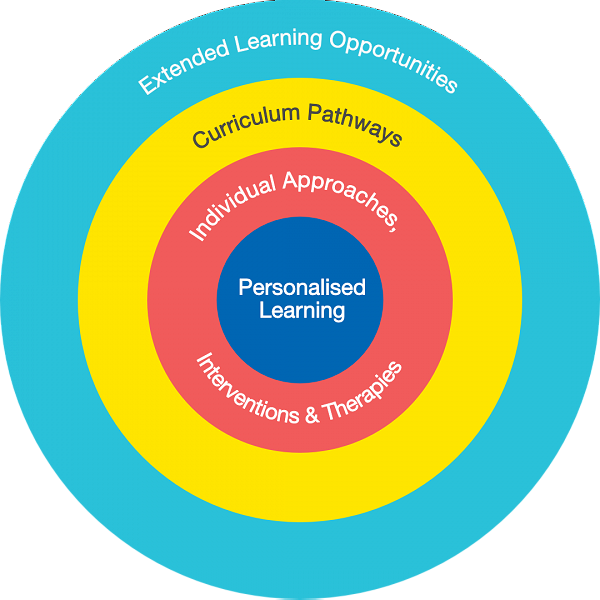
The Person Centred Curriculum
The school offers a curriculum and a programme of enrichment to ensure each learner has a personalised, rich, varied and interesting school experience.
Curriculum Intent
Our curriculum incorporates a broad, rich and meaningful approach with highly personalised holistic teaching and learning.
We want our learners at Newfield School to be:
- Effective communicators
- Empowered & challenged to realise their individual potential
- As independent as possible
- Healthy in body & mind
- Happy, engaged & included members of their community
- Confident & committed to lifelong learning
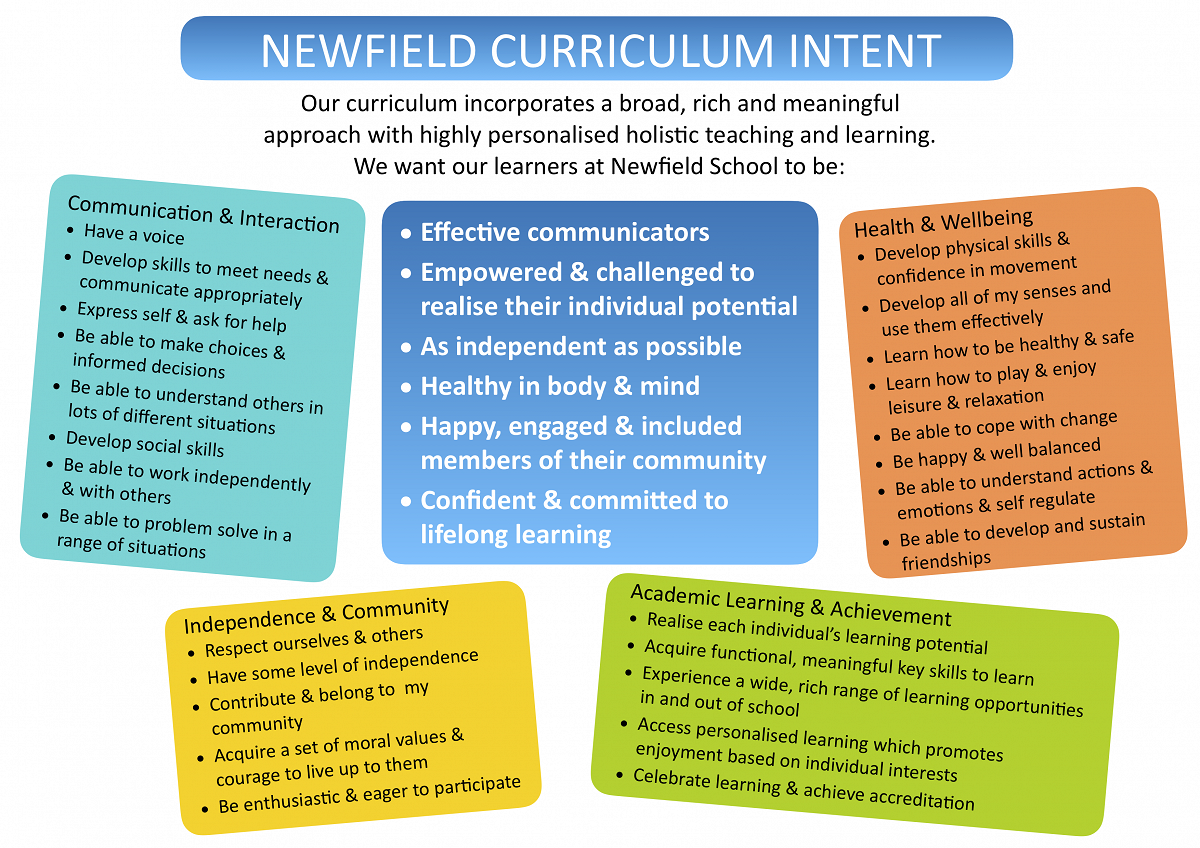
Newfield Curriculum Intent
Download as PDFCurriculum Statement
At Newfield we recognise the importance of a curriculum that promotes education, development and care whilst providing exciting and motivating learning opportunities for all our learners.
As such, our curriculum incorporates a broad, rich and meaningful approach with highly personalised holistic teaching and learning.
Curriculum Intent
We want our learners at Newfield School to be:
- Effective communicators
- Empowered & challenged to realise their individual potential
- As independent as possible
- Healthy in body & mind
- Happy, engaged & included members of their community
- Confident & committed to lifelong learning
Curriculum Implementation
All learners at Newfield School require a flexible curriculum that takes into account their specific skills and needs, including therapy needs. The school ensures that there are effective learning opportunities for the inclusion of all learners across all age phases and areas of school. Our curriculum pathways have been developed to prioritise the individual needs of our learners and to ensure that those needs identified in their Education, Health and Care Plan are central to each learner’s personalised curriculum.
Our curriculum pathways allow us to create personalised journeys to meet the needs for each individual. Our developmental skills based and creative curricular aim to encourage all of our learners to participate in opportunities that enhance their learning and independence – on whichever pathway is best for them.
Through a multi disciplinary and integrated approach learners learning styles and needs are identified. Each learner is unique and therefore can take an individualised learning pathway. Teaching and learning opportunities for our learners span the whole day, including lunch and break times, time spent on personal care and therapy routines, and indeed time at home or in short break services.
The amount of time allocated to the various subject areas will vary over time and across the different pathways.
In planning for breadth and balance across the different pathways in school we take account of:
- the statutory requirements
- the changing needs of learners
- the views of parents
- the views of a range of professionals
- the levels of support required
The school provides a range of activities differentiated according to the age and needs of the pupils. All classes have a daily act of Collective Worship.
‘Pupils’ progress in mathematics, reading, writing, communication and personal development is excellent because teachers use their accurate assessments well to plan activities which match pupils’ specific needs precisely. Ofsted, 2016
‘Pupils’ attitudes to learning are excellent’ Ofsted, 2016
More information about teaching and learning is available in the Teaching and Learning Policy.
Newfield is organised into two distinct areas of school
- The School for SEND
- The School for Autism at Newfield
Newfield's Approach to Reading
‘Through reading in particular, pupils have a chance to develop culturally, emotionally, intellectually, socially and spiritually. Literature, especially, plays a key role in such development. Reading also enables pupils both to acquire knowledge and to build on what they already know’.
The National Curriculum in England, 2013.
Intent
Our priority is both the teaching of reading skills and the enjoyment of Literature, enabling children to become lifelong readers, in line with their individual needs. We know that for all out children to become readers and writers, phonics must be taught through a systematic and structured phonics programme.
At Newfield we use the DfE approved Twinkl Phonics programme to plan and deliver daily phonics lessons, ensuring a cohesive, whole school approach to phonics. The Twinkl Phonics Programme offers a coherently planned sequence of lessons that supports the effective teaching of phonics across school. Level 1 Twinkl Phonics provides themed teaching packs to deliver each of the DfE’s Phase 1 phonics aspects. Throughout Level 1, learners develop the knowledge, skills and understanding to discriminate between and use auditory, environmental and instrumental sounds. Level 1 is taught first and then embedded throughout the teaching of phonics Levels 2-6. In Levels 2-4 learners are introduced to phonemes/sounds and graphemes/letters systematically. They also learn to develop and apply blending and segmenting skills for reading and writing.
Learners ready to progress will access Levels 5 and 6. The coherently planned sequence of lessons within Level 5 allows opportunities for children to apply their phonics knowledge and skills as the prime approach to reading and spelling. It focuses on phonetically decodable two-syllable and three-syllable words and the alternative ways of pronouncing and representing the long vowel phonemes. Furthermore, children will develop their ability to attempt to read and spell increasingly complex words. By Level 6, children explore spelling patterns and grammar while also developing a breadth of knowledge, skills and understanding in the recognition and spelling of common exception words.
The Twinkl Phonics Programme intends to not only provide children with opportunities to develop the knowledge, skills and understanding essential for reading and writing, but also, to develop each child’s confidence, resilience and engagement in phonics lessons and a love for reading and writing.
Implementation
The Twinkl Phonics Progression Map sets clear expectations for pupil’s progress within the Twinkl Phonics Programme. Due to the nature of learners at Newfield School, age related expectations have not been set, allowing pupils to develop their phonics knowledge in line with their individual needs and at their own pace. Teachers complete Twinkl Phonics tracking documents, allowing headteachers, senior leaders, teachers and practitioners to track pupil’s progress. It provides opportunities for data analysis and encourages discussions around pupil progress, group progress, future learning and misconceptions, enabling schools to respond and adapt teaching within the programme to provide additional support and challenge to pupils. The dynamic and engaging materials delivered in the daily planning packs within Levels 2-6 ensure a clearly defined structure to the teaching of phonics. The direct teacher-led lessons enable all learners to develop and apply new skills while also providing opportunities to further apply these skills within fun and engaging activities and through continuous provision. The teaching PowerPoints, stories, games, additional texts and toolkits are meticulously planned to allow children to apply and practise phonics skills. They also offer opportunities to challenge learners and provide support to teachers and parents. Teacher guides for each stage are provided to allow teachers and adults working with children to feel confident in their own subject knowledge, knowing they are fulfilling the national phonics criteria and enabling each child to achieve their potential
Impact
The impact of using the complete Twinkl Phonics Programme (including lesson packs, display photos, weekly planning and parents notes) as the basis of our phonics teaching, will be for children to develop their phonics skills and knowledge through a systematic, synthetic approach, while covering the statutory requirements outlined in the 2014 National Curriculum. The programme will prepare children who are ready and able to access the year 1 phonics screening check and can complement the DfE’s Letters and Sounds document, for other learners it is used as a stand-alone programme. Following the programme gives Newfield School a consistent approach to phonics, which are clear to teaching staff and learners. Parental engagement can also be improved through the use of the parent guidance sheets.
Specialist Reading Strategies
Many of our learners have communication needs including Autism which can present barriers to learning when accessing phonics lessons. As such, alongside a synthetic systematic phonics programme, pupils are supported to develop reading through regular shared reading, non-verbal interactive reading opportunities, discussing stories using assisted communication, reading and writing with communication aids, and practicing literacy across the curriculum to embed skills. Alongside fluency, comprehension skills are also a main area of focus within reading- looking at skills such as handling and accessing books appropriately, finding the beginning and end of a book, re-telling stories and prediction. We believe that high-quality literature is key to motivating children to read and instilling in children a love of literature. Children are ready to regularly in school through library and in class sessions.
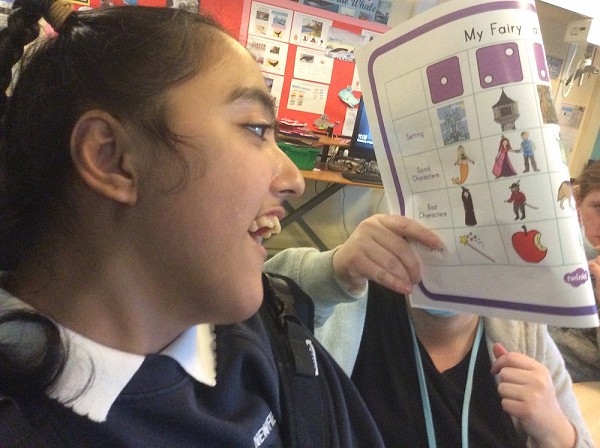
What does reading look like at Newfield?
The teaching of reading in EYFS
- Twinkl phonics- daily. Initially phase 1. The focus is initially on sounds in the environment
- Sharing high quality stories and rhymes
- Reading continuous provision in class
- Teachers and EHCAs to read with pupils regularly- at least once per week
- Regular trips to the school library
- Working towards the Early Learning Goals for English
- Use of Rhino Readers texts from school library to apply and practice phonics learning
- Reading skills and knowledge to be accessed in context of age appropriate themes and texts as identified on the theme map (see separate document).
The teaching of reading in KS1
- Twinkl phonics- daily. Taught in phonics groups in line with pupil phonics trackers. Pupils needing additional support to be identified and interventions put in place.
- Sharing high quality stories and rhymes
- Reading continuous provision in class
- Teachers and EHCAs to read with pupils regularly- at least once per week
- Regular trips to the school library
- Working towards the National Curriculum through reading scheme of work
- Use of Rhino Readers texts from school library to apply and practice phonics learning
- Reading skills and knowledge to be accessed in context of age appropriate themes and texts as identified on the theme map (see separate document).
The teaching of reading in KS2
- Twinkl phonics- daily. Taught in phonics groups in line with pupil phonics trackers. Pupils needing additional support to be identified and interventions put in place.
- Sharing high quality stories and rhymes
- The children take a reading book home to share with the family and enjoy with adult support.
- Reading corner in class
- Teachers and EHCAs to continue to monitor children’s reading progress through a combination of individual and group reading.
- Regular trips to the school library
- Working towards the National Curriculum through reading scheme of work
- Use of Rhino Readers texts from school library to apply and practice phonics learning
- Reading skills and knowledge to be accessed in context of age appropriate themes and texts as identified on the theme map.
- Opportunities to develop reading through play
The teaching of reading in KS3
- Twinkl phonics- daily. Taught in phonics groups in line with pupil phonics trackers. Pupils needing additional support to be identified and interventions put in place.
- The children take a reading book home to share with the family and enjoy with adult support
- Teachers and EHCAs to continue to monitor children’s reading progress through a combination of individual and group reading.
- Opportunities for independent reading to encourage children to develop reading stamina and reading for pleasure.
- Regular trips to the school and community library
- Working towards the National Curriculum through reading scheme of work
- Use of HiLo Catch Up texts from school library to apply and practice phonics learning
- Reading skills and knowledge to be accessed in context of age appropriate themes and texts as identified on the theme map
The teaching of reading in KS4
- Functional reading focus, phonics strategies continue to be referred to when reading and writing. Pupils needing additional support to be identified and interventions put in place.
- The children take a reading book home to share with the family and enjoy with adult support
- Teachers and EHCAs to continue to monitor children’s reading progress through a combination of individual and group reading.
- Opportunities for independent reading to encourage children to develop reading stamina and reading for pleasure.
- Regular trips to the school and community library
- Use of HiLo Catch Up texts from school library to apply and practice phonics learning
- Reading skills and knowledge to be accessed in context of age appropriate themes and texts as identified on the theme map.
Text in italics above shows differences in teaching from previous key stage - indicating how teaching progresses across school.
For more information, please see our English policy
click here to view or download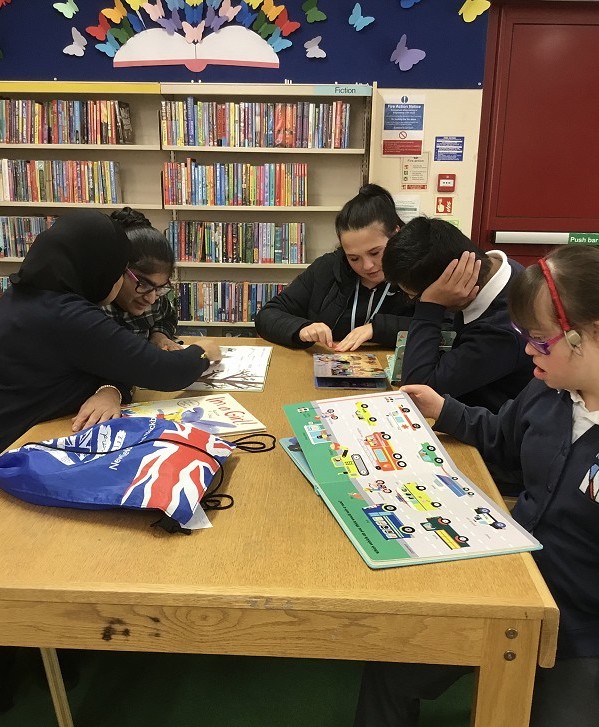
Developing a love of reading
To ensure learners leave us with a life-long love of books, reading for pleasure is prioritised across the school and books are central in our libraries, classrooms and teaching.
- Storytelling forms a key part in our teaching- classes will bring stories to life through sensory activities in props to ensure books are meaningful and engaging for our learners
- We have dedicated reading/ book corner in each classroom where diverse books are readily available (in the form of continuous provision in EYFS & KS1)
- We have two school libraries which are currently being redesigned. They contain a range of high-quality texts based on recommended texts from Books for Topics. Our libraries are organised to have a primary and secondary section to ensure books pupils are accessing are age appropriate and engaging
- We have an annual school Book Fair and always celebrate World Book Day
- Books are sent home with children and updated regularly, along with access to eBook access, to promote reading both at school and home
Newfield Curriculum Pathways
The grouping of learners according to their ability and need promotes effective learning as the classes are structured to best cater for the learning styles of learners, whether that be semi-formal learners or pre-formal learners.
Our curriculum pathways are driven by the identification of individuals’ personal targets, and as the needs of our learners evolve, we continually assess the most appropriate pathway for them. Learners can move between pathways to achieve a personalised model to meet their individual needs. This offers a degree of flexibility for learners to progress into more appropriate pathways as they develop their learning skills. Learners have personalised targets, which are shared with parents/carers to extend learning opportunities outside of school. Our aim is to engage our learners in enjoyable learning activities that are of functional value to them now and in their futures.
We see the essential focus areas as:
- personalising learning opportunities
- developing our learners ability to communicate and interact with others
- improving learners physical abilities and sensory development
- enhancing personal, social, health and emotional skills
- developing cognitive skills
- developing independence
Our pathways are designed to have an innovative style to learning to stimulate our learners to acquire a continuum of learning opportunities. Our creative themed-based approach is planned to ensure it provides breath and flexibility; it is relevant, inclusive, supporting a balance of learning experiences and opportunities to meet individual needs. Our curriculum pathways have been devised to support the skills and confidence individuals need to be ready for learning, developing independence alongside therapy interventions. We acknowledge that some learners’ needs may cover more than one pathway, and that those additional requirements for every learner should be taken into consideration. Through whole class sessions, small and 1:1 groups, enrichment experiences and medical, sensory and behavioural interventions we aim to use time flexibly and creatively to maximise learning opportunities.
Learners at Newfield follow their own pathways, based on the following Curriculum Pathways:
- Pre-Formal Pathway – for learners previously working at levels P1i to P4
- Semi-Formal Pathway - for learners previously working at levels P4 to P8
A very small number of learners at Newfield may progress to be working at a higher level and we address their needs with a bespoke ‘formal’ curriculum offer.
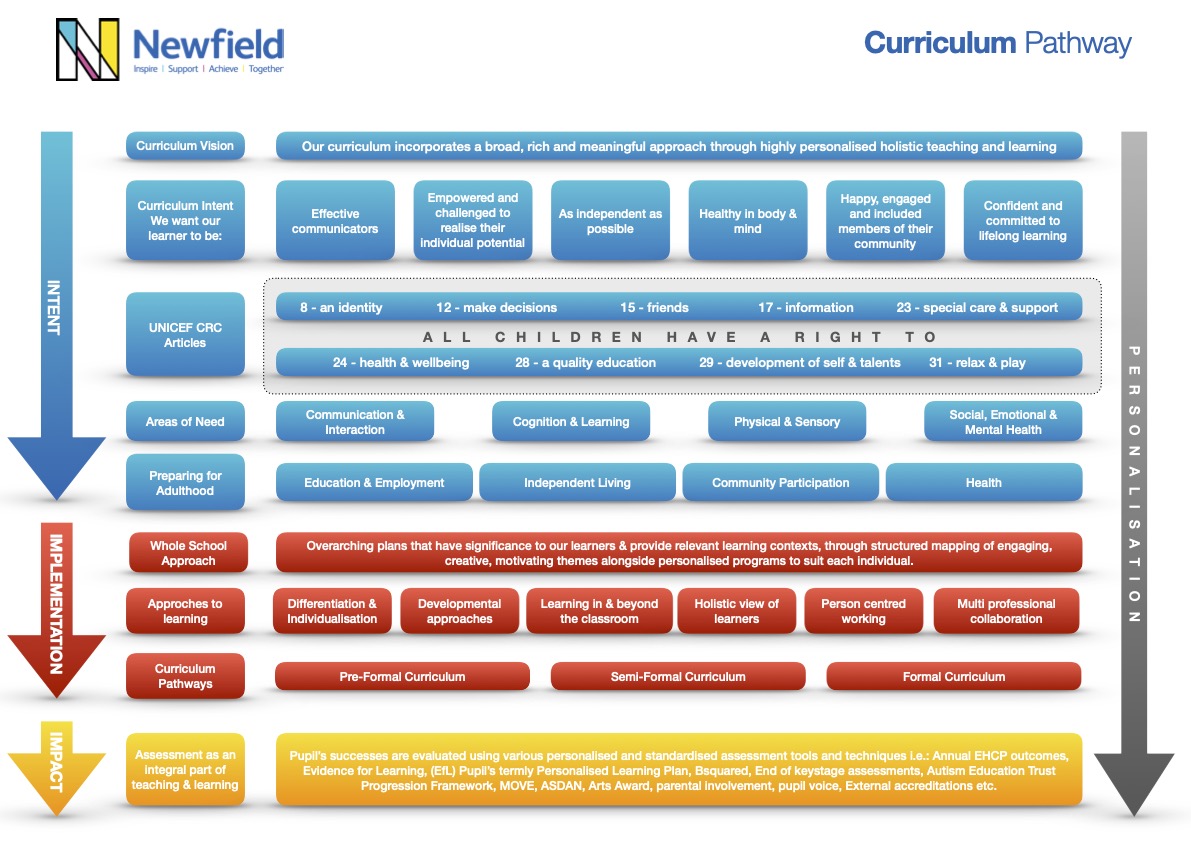
Early Years Foundation Stage - EYFS
At Newfield School we acknowledge and celebrate the differences in the needs and learning styles of our younger children. As such the pedagogical approach taken during the formative years is an eclectic mix approach designed to optimise success for all our children. Teachers at this stage aim to develop skills through play-based approaches where children have resources and environments to explore and develop their knowledge and understanding of the world around them. Continuous provision gives children a range of experiences and play media with adults supporting and playing alongside. The outdoor environment is also capitalised upon to provide learning opportunities.
Staff practice the three principles of effective teaching and learning in all aspects of the curriculum.
- playing and exploring – children are encouraged to explore their environment with as much independence as possible. Some children require additional support to be able to handle objects or explore them safely so staff aim to do this while enabling children to ‘have a go’ and explore as freely as possible.
- active learning – staff create opportunities for active learning to take place by planning activities and providing resources that are accessible for the children. They may be involved in a range of therapy programme which are integrated into their learning experience to create opportunities for them to be actively involved in their learning activities.
- creating and thinking critically – a thematic approach helps children make links and begin to develop the skills of thinking critically and creatively. Staff provide experiences that optimise the children being able to think through problems and find solutions for themselves. Some children may have significant cognitive difficulties so all experiences will be accessible to them at an appropriate level.
Staff prioritise nurturing warm and respectful relationships in all aspects of the early years and ensure children feel safe and secure to learn and flourish.
Parental input is of paramount importance as by working together we feel we can develop and maximise your child’s development, enabling them to achieve. All classes have a daily act of collective worship.
‘The provision for children in the early years is outstanding. Children benefit immensely from adults’ focus on providing sensory stimulation in a calm and purposeful environment’ Ofsted, 2016
Curriculum Organisation
Foundation Stage
The EYFS curriculum is a developmental curriculum, which plays a diagnostic role in establishing which of the pathways the child begins.
There are three key areas at the core of our EYFS curriculum.
- Communication & Language
- Physical Development
- Personal, Social & Emotional Development
The four specific areas of learning are planned within the themes and activities children access.
- Literacy
- Mathematics
- Understanding the World
- Expressive Arts & Design
RE is incorporated into the area of Understanding the World through the aspect of People and Communities and is also delivered through assemblies.
The Early Years Curriculum at Newfield is developed using half termly themes.
These themes are developed to ensure all children are able to develop their skills within all seven areas of learning whilst working towards the Early Learning Goals.
Learning is presented through a mix of continuous provision and adult led activities. Carefully chosen and organised experiences are available for children to access play independently and with support. These activities include messy play, creative, sensory/ role-play, books, music, computers and outside provision. Adult led activities are used to develop specific skills and support learning. In all areas of the classroom, staff will observe, support and engage with children working towards their individual targets. Pupils also join in weekly physical sessions and swimming in the school pool with familiar staff. Sessions also take place in our sensory studio.
It can be very hard for some children to initiate and lead their own play and it is through thorough observation and informed judgement that staff are able to respond to each child’s emerging needs and interest, guiding their development through warm positive interaction.
‘Children experience a range of activities based on a specific topic. This ensures children spend time mastering their skills in different contexts and is an example of strong and effective practice’ Ofsted, 2016
EYFS long term plan
click to downloadAge 5 - 16
Our aim is to gradually prepare our learners for adulthood and to help them to mature and become more independent. In the 5 - 16 phase we give learners new and exciting opportunities to learn and to develop skills that will last a lifetime.
Learners begin to be given more choices about their lives and their learning. They are encouraged to make more independent decisions and to reflect on themselves as individuals. Learners in the key stage 4 age phase (14-16) begin to take part in nationally accredited courses - ASDAN Transition Challenge.
Newfield School uses a range of traditional and alternative teaching techniques in order to maximise the learning opportunities and promote independence for the pupils who attend. Many students have individualised learning programmes to assist them to overcome particular barriers to learning, such as visual/hearing impairment, physical or communication difficulties. The school also promotes the use of other specialist teaching techniques and programmes such as Picture Exchange Communication Systems (PECs), Makaton, and electronic resources to aid communication. We also offer additional programmes and therapies, such as Speech and Language Therapy, Occupational Therapy, Physiotherapy, Music Therapy, Hydrotherapy and Sensory Integration.
‘Effective teamwork is a strong characteristic of the school. Teachers and teaching assistants work seamlessly together to ensure that opportunities for learning are rarely missed’ Ofsted, 2016
Each class has a Teacher and a team of Education, Health and Care Assistants to work together on differentiation of the curriculum which is based on the acquisition of identified key skills and enables the individual needs of the pupils to be at the heart of the teaching methods and lesson delivery. All classes have a daily act of collective worship.
You will find more information about this in our section about our curriculum pathways.
Age 16 - 19
As students enter the 16-19 phase of school, they follow a curriculum designed to help them transition successfully into adult life. We aim for our young people to be actively involved within the local community and to be as happy, confident and independent as possible.
Students are grouped according to their age and all are able to work towards ASDAN or Edexcel qualifications that recognise their individual achievements. Learning opportunities are designed to be relevant and meaningful for each learner, whilst helping to prepare them for adult life. Students have increased opportunities to take part in activities within the community setting and also to develop links with adult colleges and other services.
‘The quality of teaching in the school’s sixth form is outstanding because teachers effectively use their accurate assessment of what learners can do. They plan lessons and activities which provide an appropriate level of interest and challenge for all learners’ Ofsted, 2016
Curriculum Organisation
Key Stage 5 (Years 12, 13 and 14)
In addition to the bespoke pathway the learner has followed throughout school, in the Post 16 provision learners are offered a broad range of learning experiences designed to promote their personal development and aid them to make a smooth and well-equipped transition into adult life.
The core curriculum is based around 4 key areas:
- Independent living skills
- Work related learning
- Personal, social and emotional development
- Community Participation
Independent Living Skills
It is important that when our students leave Newfield, that they are as independent as possible. Personalised learning activities help students to develop skills in key areas such as communication, personal care, shopping, cooking and travel training.
Work Related Learning
Students take part in a range of mini-enterprise activities within school, which may include running a café and making items to sell at enterprise events in school and at Blackburn Market or the annual Christmas Fair. They also participate in a range of creative activities to learn about different job roles. In addition, students have the opportunity to engage in work experience activities within the community, e.g. working on a local farm.
Personal, Social and Emotional Development
Students continue to develop the skills to enable them to engage positively with others – particularly new people in community settings/adult services. They are encouraged to make choices and to express preferences about activities and experiences.
Community Participation
Students have the opportunity to access a range of activities within the local community – including shopping, swimming, going to the gym, visiting the park or café. They also participate in activities with some post 19 providers in order to help prepare for their transition to adult services.
‘The frequent well-planned visits into the local and wider community are effective in ensuring learners strengthen their social skills. These visits also serve to demonstrate learners’ outstanding behaviour and their positive attitudes to learning’ Ofsted, 2016
As well as these core activities, our students also engage in a range of enrichment activities.
These include:
- Creative activities – dance, music, drama, art, design and technology
- Therapies – physiotherapy, speech and language, sensory integration
- Sensory experiences
- Access to sex and relationships education
- Access to counselling
- Whole school events
All classes have a daily act of collective worship.
Some students may be entitled to financial support - see information regarding 16-19 Bursary.
Accreditation
Throughout the 16-19 curriculum, all students complete modules that contribute towards an ASDAN qualification. Individual accreditation routes are personalised and based on the interests and abilities of each student.
Where appropriate, students are also able to access Edexcel qualifications, including Functional Maths and English.
Careers and Transitions
Students in Y14 meet regularly with one of our HLTAs to develop a Person Centred Plan – identifying the activities they enjoy and what their hopes are for the future.
These plans are shared with any future services to help students to transition smoothly.
New Directions also attend reviews in Y9, Y11 and Y14 in order to support students and their families with the transition process.
New Directions are able to share information about different services and will support families to visit colleges and other adult services.
Once a suitable provision has been identified, students are supported to engage in transition visits to prepare them for moving on to a new setting.
For additional curriculum information please look at our 11 19 flyer 2019
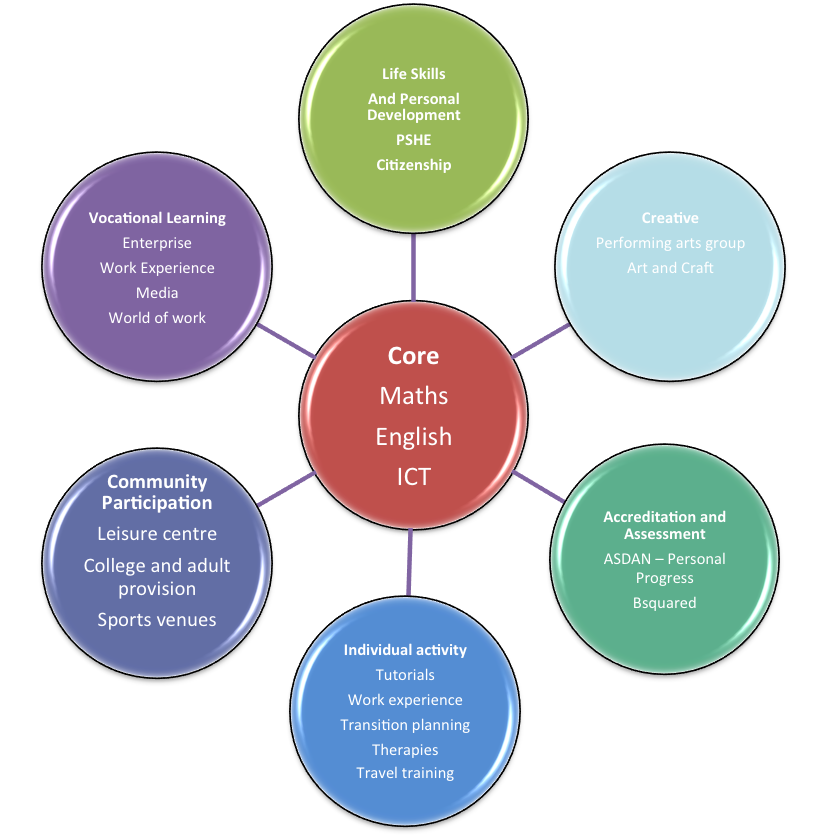
Sex & Relationships Education
Newfield School delivers relationship/sex education for all pupils in a manner appropriate to their age and development with emphasis is placed upon relationships and relationship building. The PSHE curriculum is delivered through both discrete and integrated modules that are part of the ethos of the school. Individual pupils may receive specific information at the request of the parents and in order to assist a pupil in understanding a particular issue or behaviour.
Individual or small group ‘Body Awareness’ sessions may also be facilitated by the school counsellor working alongside our nursing team who have had specialist training in working with children with SEN on sex and relationship issues. Parents will be kept fully informed and invited to come and discuss any concerns before any sessions take place. There is a great deal of emphasis on protecting the child from harm and helping the child to keep themselves safe.
Parents can withdraw their child from taking part in Sex & Relationships Education by informing the Head Teacher in writing.
‘A course on ‘Body Awareness’ has been successful in supporting children to understand their health and how to get support. A member of staff said ‘they are being empowered to say no.’ As children with disabilities are more vulnerable to abuse and neglect than other children, the school places a great emphasis on child protection’ RRSA, June 2017.
‘Pupils’ personal development is outstanding because adults model superbly the school’s values of ‘Inspire, Support, Achieve, Together’ in everything they do’ Ofsted, 2016
Religious Education
All children who attend Newfield School take part in discrete Religious Education lessons, which enable them to learn about world religions, spirituality and morality.
We adapt the BwD Agreed Syllabus for RE 2017 2022 to meet our learners needs.
‘The school’s excellent provision for pupils’ spiritual, moral, social and cultural development contributes well to their strong social and emotional resilience’ Ofsted, 2016
Parents/Carers have the right to withdraw their children from Religious Education lessons and should contact school if they wish to do so.
Arts Policy & Provision
We believe that the arts provide an opportunity for all pupils to express and explore their emotions and feelings through providing vivid images/sounds aimed at promoting the development of expression.
Newfield is proud have become a nationally accredited Arts Award Centre in January 2015 - see Arts Award information.
There is also a dance element to the PE curriculum that also introduces the pupils to a variety of moods and themes for expression.
Newfield has a very active school choir, which sings and signs and takes part in a wide variety of local choral events each year.
